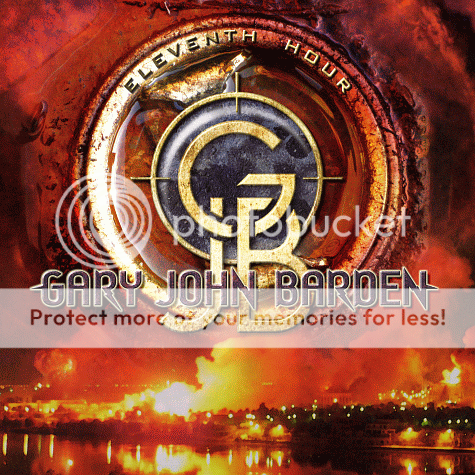 Best known for lending his vocals to a few of the early Michael Schenker Group’s releases, Gary Barden has been a jobbing vocalist for decades. Aside from his work with Schenker, his voice can be heard on albums by Silver, Praying Mantis and Statetrooper. 2011’s ‘Eleventh Hour’ is his fifth solo record.
Best known for lending his vocals to a few of the early Michael Schenker Group’s releases, Gary Barden has been a jobbing vocalist for decades. Aside from his work with Schenker, his voice can be heard on albums by Silver, Praying Mantis and Statetrooper. 2011’s ‘Eleventh Hour’ is his fifth solo record.
The album begins in a rather unsubtle manner. The heavy-handed ‘Baghdad’ presents a heavy-ish riff coupled with some already out-of-date political statements (ridiculously simplified to children’s news level). Although the tune is augmented in places by equally unsubtle effects noises of bombs and the like, the riff itself is a more than reasonable one. Sadly, however the show’s over once Gary Barden starts to sing… Over the riffs, he wails such lyrical howlers as “George W and Tony Blair took years to find the madman’s lair”, after which it’s impossible to even try to take this seriously. Some of the other lyrics are harder to decipher in places due to Barden’s over-singing, which hasn’t improved much over the years; it’s still full of unnecessary growls, warbles and other potentially nasty elements. In fairness, it could be said that Barden sounds a little better on parts of this release than on Statetrooper’s 2004 outing, ‘The Calling’ – where he wailed like he was having a kidney removed without anaesthetic – but, most of the time, that’s not saying much.
The following couple of tracks are less bombastic, as if Barden believes he’s made his grand statement and can now settle into something more natural…and perhaps more fun. With an upbeat pace, ‘Fallen By The Wayside’ is a slice of rock with plenty of drive where the twin lead guitars are the obvious high point, while ‘Child of Sorrow’ is a stomping rocker – the kind you’ll find on any number of Rainbow-esque hard rock discs. The needle on the cheeseometer is flickering off the end of the scale here, but at least it could be said this number attempts to bring a rousing chorus to the table. It’s okay, yes, but you’ll certainly find better examples of this kind of thing on hundreds of other melodic rock discs out there.
‘Easy Does It’ offers one of the best riffs on the album, as well as one of the best vocals. Instead of going for the big rock edge, Barden attempts something soft and soulful (albeit still in a rock style); the slightly gritty element in his voice works well as he hits the longer vibrato-filled notes. A more than commendable bluesy guitar solo ups the stakes here too, before the track loses its way temporarily. All bluesy elements are eschewed in favour of a faster paced swagger that’s just horrid. It may only be temporary, but it’s so ill-judged, as if it was shoehorned in from another work in progress. Despite this faux pas, it’s a track which showcases what Barden and band are capable of when everything comes together – it’s a shame those times are somewhat of a rarity. The eight minute epic ‘Before The Eyes of The World’ brings with it another superb riff – the kind which would have been at home on Dio’s ‘Angry Machines’ record of ’96, but aside from a twin lead solo it doesn’t really offer much more of any real interest. Barden’s vocals are average at best, and even that once-promising riff starts to sound repetitive and leaden before too long. Bringing in the track at half the length could have been a great improvement…
‘Would You Wanna Do’ is another of the better numbers (although, as always, better is a relative concept). A pleasing selection of guitar arpeggios during its verses starts things off well enough, while a good sense of melody during the pre-chorus and a few decent lead guitar moments also help the track stand out. The chorus doesn’t live up to the promise set out by the pre-chorus, however, and the female vocals on hand instantly make the piece sound dated. On the plus side here, Barden reins in his voice a great deal, making it much less of an endurance on the listener. On the negative, yet again, it sounds like a recording from a third generation cassette dub, thanks to the slack production values. That production just mars many of the good moments on this album – often sounding like you’re listening on the morning after a particularly loud gig. It’s a pity; a much slicker (ie: more expensive) production could have improved this album’s general feel, even though it would never have saved us from Barden’s terrible lyrics.
Bulking an already not especially enjoyable disc out to eleven songs, Barden offers his own recording of ‘Don’t Take Me For A Loser’ – an early 80s co-write, originally featured on Gary Moore’s ‘Corridors of Power’. Lacking any of Moore’s effortless style, Barden and band chug their way through the tune in a workmanlike manner: the lead guitar work never rises above average, the lead vocals are okay at best and the female backing voices are lost somewhere in the sludge. On the plus side, it’s still a well constructed tune – a hundred times better than most of ‘Eleventh Hours’ paltry efforts.
With ‘Eleventh Hour’, Barden adds yet another pretty ropey release to his expanding legacy of mediocrity. Generally speaking, his backing band is okay, but Barden himself proves to be a wholly second division talent in both the vocal and song-writing stakes – someone rarely worth the admiration he seems to gather. This is an album for his devoted fans only; other melodic rock aficionados would be best advised to spend their hard-earned cash elsewhere.
November 2011
